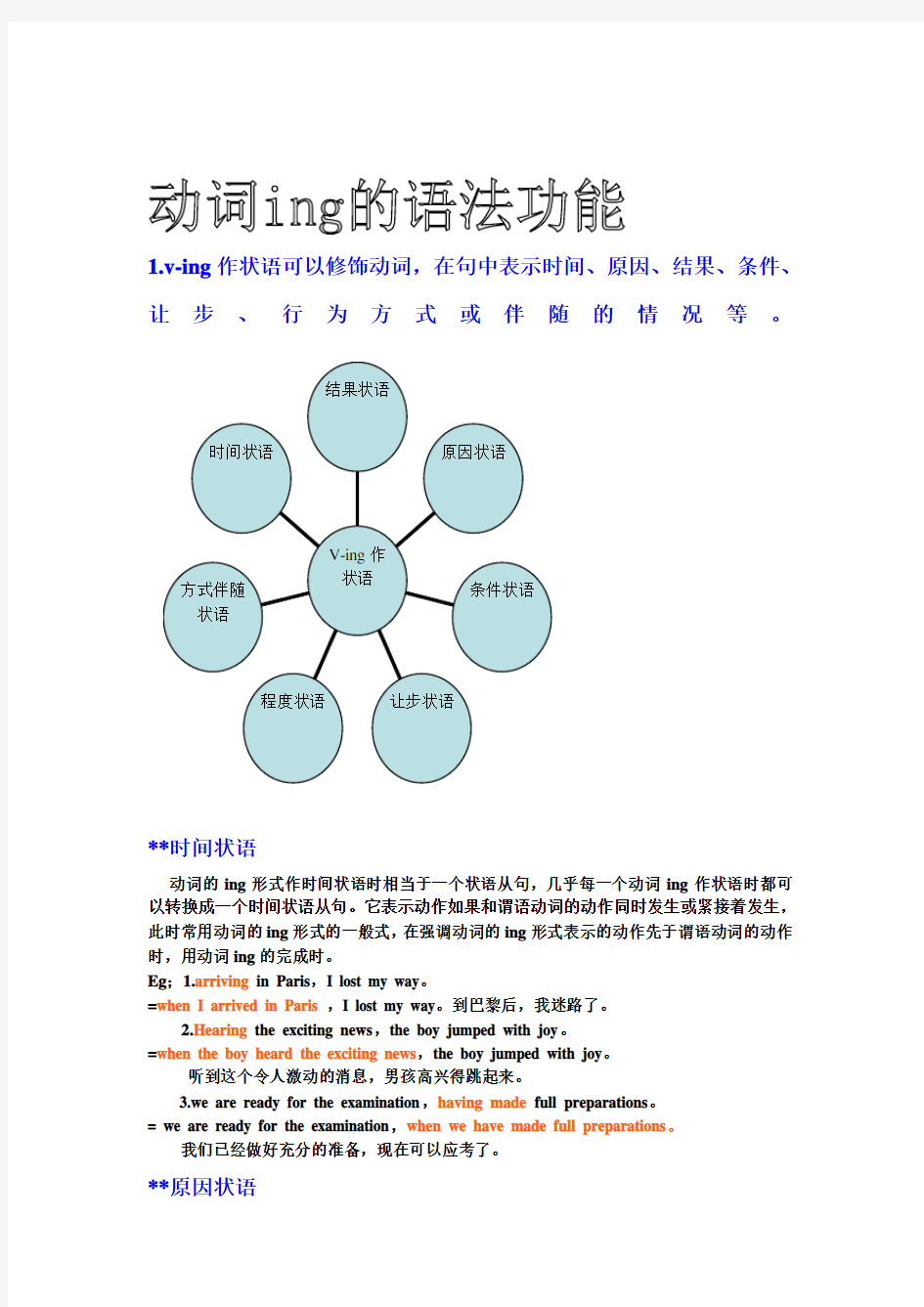
动词ing作状语
- 格式:doc
- 大小:53.00 KB
- 文档页数:4


1.v-ing作状语可以修饰动词,在句中表示时间、原因、结果、条件、让步、行为方式或伴随的情况等。
**时间状语
动词的ing形式作时间状语时相当于一个状语从句,几乎每一个动词ing作状语时都可以转换成一个时间状语从句。它表示动作如果和谓语动词的动作同时发生或紧接着发生,此时常用动词的ing形式的一般式,在强调动词的ing形式表示的动作先于谓语动词的动作时,用动词ing的完成时。
Eg;1.arriving in Paris,I lost my way。
=when I arrived in Paris,I lost my way。到巴黎后,我迷路了。
2.Hearing the exciting news,the boy jumped with joy。
=when the boy heard the exciting news,the boy jumped with joy。
听到这个令人激动的消息,男孩高兴得跳起来。
3.we are ready for the examination,having made full preparations。
= we are ready for the examination,when we have made full preparations。
我们已经做好充分的准备,现在可以应考了。
**原因状语
动词的ing 作原因状语时,相当于一个原因状语从句,同时也可以转变为一个原因状语从句。它表示的原因的动词ing 形式短语一般置于句首。
Eg;1.having smoked too much ,he has suffered from lung cancer。
=as he has smoked too much ,he has suffered from lung cancer
由于抽烟过多,他得了肺癌。
2.living far from my company,I have to get up early。
=because I live far from my company,I have to get up early。
由于住得离公司远,我只好早起。
3.not knowing her address,I might as well call her to come over。
=because I do not know her address,I might as well call her to come over。
不知道她的地址,我只好打电话让她来。
**结果状语
动词的ing作结果状语时,不常用,通常放在句末,中间有逗号。它可以转化成结果状语从句。
Eg;1.the fire lasted nearly a month,leaving nothing valuable。
大火持续了近一个月,几乎没剩下什么有价值的东西。
**方式、伴随状语
动词ing表示方式或伴随情况是比较常见的,它用来说明发生的背景或情况。
Eg,1.I stood by the door,not daring to say a word。
我站在门旁边,不敢说一句话。
2.my parents wrote me a letter ,telling me to change my job。
我父母来信让换我工作。
3.i lay on the grass,staring at the sky for a long time。
我躺在草地上,长时间的望天空。
4.talking and laughing,the kids walked one by one into the classroom。
孩子们有一个个说有笑的走进教室。
5.theycame running all the way。
他们一路跑过来。
**条件状语
动词的ing作条件状语一般位于句首。
Eg;1.going straight down the road,you will find the department store。
顺着路一直走,你会发现那家百货公司。
2.working hard at your lessons,you will succeed。
如果好好学习,你就能成功。
**让步状语
Eg;1.knowing all this ,I still wanted to see it myself。
尽管知道了这一切,我还是想亲自去看看。
=though I knew all this ,I still wanted to see it myself。
2.working hard as he did ,he still failed。
=though he worked hard as he did ,he still failed。
尽管他很努力,他还是失败了。
**程度状语
动词ing形式在习惯上可以作程度状语,常译作;‘很’、‘非常’、‘极度’,也可以与very 互译。
Eg;1.it was freezing cold yesterday。
昨天很冷。
2.she is an amazing girl。
她是一位迷人的女孩。
***补充;
常见的动词ing短语